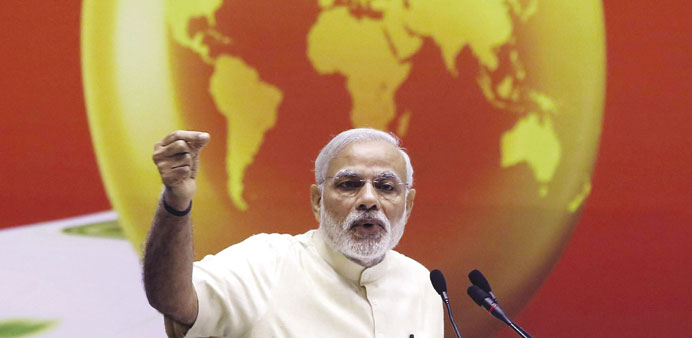Reuters/New Delhi
Prime Minister Narendra Modi has asked for a drastic cutback of an ambitious healthcare plan after cost estimates came in at $18.5bn over five years, several government sources said, delaying a promise made in his election manifesto.
Modi has had to make difficult choices to boost economic growth - his government’s first full annual budget, announced last month, ramped up infrastructure spending, leaving less federal funding immediately available for social sectors.
The health ministry developed a draft policy on universal health care in co-ordination with the prime minister’s office last year. The National Health Assurance Mission aims to provide free drugs, diagnostic services and insurance for serious ailments for India’s 1.2bn people.
The health ministry proposed rolling out the system from April 2015, and in October projected its cost as $25.5bn over four years. By the time the project was presented to Modi in January the costs had been pared to 1.16tn rupees ($18.5bn) over five years.
That was still too much. The programme was not approved, three health ministry officials and two other government sources said.
Three officials said the health ministry has been asked to revamp the policy, but work is yet to start.
“The constraint on the country’s financial resources was conveyed to health officials, and even to those from other ministries,” said one government official who is not from the health ministry but attended the meeting where Modi was present.
The meeting was held in January and the discussions were not made public. All of the sources declined to be named because of the sensitivity of the discussions.
Officials at the prime minister’s office and the finance ministry, as well as the health ministry, did not respond to requests seeking comment.
Modi’s manifesto ahead of the election that brought him to power last year accorded “high priority” to the health sector and promised a universal health assurance plan. The manifesto said previous public health schemes, that have been mired in payment delays recently, had failed to meet the growing medical needs of public.
Modi has another four years left in his first term to fulfil the promise.
India currently spends about 1% of its gross domestic product (GDP) on public health, but the badly-managed public health system means funds are not fully utilised. A health ministry vision document in December proposed raising spending to 2.5% of GDP but did not specify a time period.
So health experts were dismayed when the federal budget for the full-year starting April raised the allocation for the country’s main health department only by about 2% from the previous year, less than inflation. The meagre increase dimmed prospects for the massive health plan, they said.
“How can it happen when you have truncated resources?” one health ministry official asked.
The health plan was drafted in consultation with Modi’s office and an expert panel, including an expert from the World Bank.
The proposal included insurance to cover more expensive and serious ailments such as heart surgeries or organ failure.
Two government officials said this benefit will be withdrawn. The health ministry was also asked why the new plan could not be simply combined with existing health schemes.
Rich urged to give up gas subsidies
Prime Minister Narendra Modi yesterday urged affluent Indians to give up their cooking gas subsidies to help the energy-starved country’s poor access clean fuel. Fuel subsidies are a massive expense in India, contributing to an overall subsidy bill that ballooned to $43bn, or 2% of gross domestic product (GDP), under the previous government. “I appeal to all those who can afford cooking gas at market rates to please give up your gas subsidies,” Modi said at an energy conference in New Delhi. “The money we save with your help, we will use for the poor so that they have access to clean energy too.” He said 280,000 consumers had already voluntarily unsubscribed from a programme that offers subsidised cooking gas, helping the government save Rs1bn. Modi said the country should cut oil, gas and petrol imports by 10% over the next seven years as it seeks to reduce its energy bills and become more self-sufficient.

